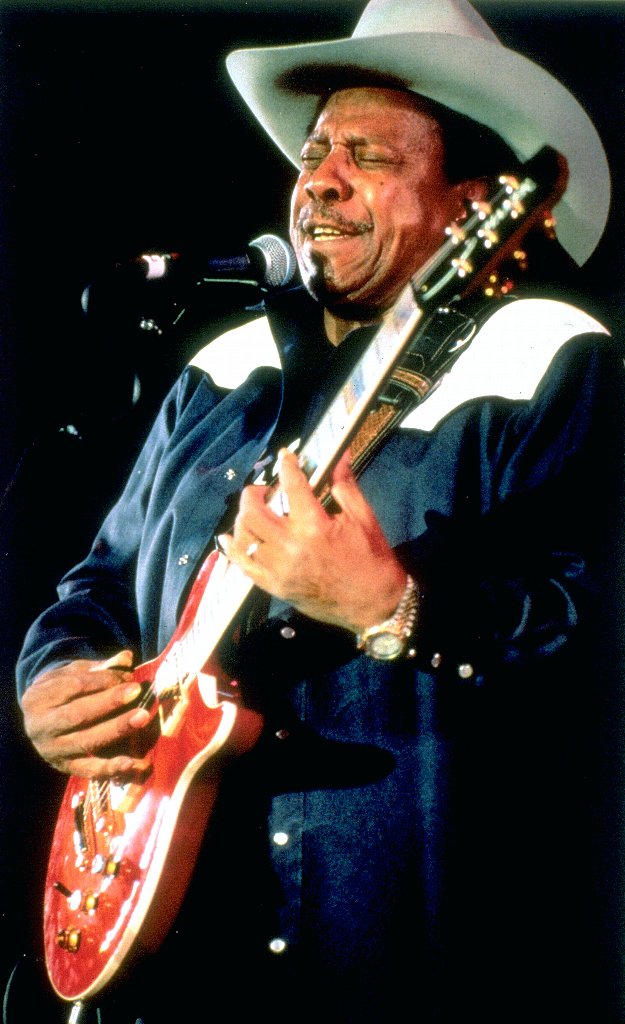Grammy-nominated Chicago blues icon Lonnie Brooks, whose music Rolling Stone called, “witty, soulful and ferociously energetic…simply astonishing guitar work,” died on Saturday, April 1, 2017 in Chicago, according to his son, Ronnie Baker Brooks. He was 83. Guitar Player described him as “…like a fire-and-brimstone preacher, testifying the blues from the bottom of his soul.”
With his “booming, gritty vocals and fierce six-string firepower” (Chicago Tribune), Brooks created an instantly recognizable signature sound. It combined Chicago blues, rock ‘n’ roll, Memphis soul, swampy Louisiana grooves and country twang into a style that his fellow musicians called “voodoo blues.” He was inducted into the Port Arthur Historical Society Hall Of Fame in 2001 and the Blues Hall Of Fame in 2010. On June 12, 2012 Mayor Rahm Emanuel declared Lonnie Brooks Day in Chicago.
Lonnie Brooks was born Lee Baker, Jr. on December 18, 1933. Over the course of his 60-year career, he recorded 11 full albums and dozens of 45s for a number of labels. His career began in Port Arthur, Texas in the mid-1950s. Recording under the name Guitar Junior, he scored a string of regional hits, including Family Rules and The Crawl for the Goldband label.
The success of his singles led to numerous southern tours and a busy performance schedule that included dancehalls, juke joints and roadhouses across Texas and Louisiana. In 1959, Lonnie befriended the great Sam Cooke, who suggested his move to Chicago. Once settled, he changed his name to Lonnie Brooks (Chicago already had a Guitar Junior) and became infatuated with the sound of deep Chicago blues. He soon landed a job as a sideman with blues hit-maker Jimmy Reed, with whom he toured and recorded. Brooks cut a handful of singles throughout the 1960s, as well as appearing on a number of Chicago blues and R&B recording sessions. He played nightly in the bars on the South and West sides of Chicago and in Gary and East Chicago, Indiana. In 1969, Capitol Records released Brooks’ first album, Broke an’ Hungry, under his old stage name, Guitar Junior.
In 1978, Brooks recorded four songs for Alligator Records’ Grammy-nominated Living Chicago Blues anthology. This led to a full contract with the label. His Alligator debut, Bayou Lightning, was released in 1979. The album, along with Brooks’ roof-raising live performances, brought him to the attention of Rolling Stone, which ran a six-page feature on the legendary musician. The album won the prestigious Grand Prix du Disque Award from the 1980 Montreux Jazz Festival. While appearing in Montreux, Lonnie befriended country star Roy Clark. Clark was so impressed with Lonnie that he arranged an appearance for Lonnie on the popular country music television show Hee Haw.
Constant touring in the U.S. and abroad kept Brooks in the public eye. His scorching 1980 live performance of Sweet Home Chicago on the Blues Deluxe album (resulting in Brooks’ second Grammy nomination) is now considered the quintessential version of the song. A 1982 trip to Germany resulted in an hour-long Lonnie Brooks special shown on German television. BBC radio broadcast an hour-long live performance across all of Great Britain in 1987. Brooks spent the summer of 1993 on a national concert tour with B.B. King, Buddy Guy, Koko Taylor, Junior Wells and Eric Johnson. In 1995 Eric Clapton honoured Brooks by inviting the bluesman on stage for an unforgettable impromptu jam at Chicago’s Buddy Guy’s Legends club. In 1998 alone, he appeared in the film Blues Brothers 2000, performed on The Late Show With David Letterman and co-authored (along with his son Wayne Baker Brooks and music scribe Cub Koda) the book Blues For Dummies.
His final two releases, 1996’s Roadhouse Rules and 1999’s Lone Star Shootout (recorded with fellow Gulf Coast blues veterans Long Joh n Hunter and Phillip Walker), showed Brooks at his very best — an electrifying guitarist with full-throated vocals, clever original songs, and a dedication to having fun. His recording of It’s Your World from Roadhouse Rules was featured in an episode of HBO’s The Sopranos. In 2008, Brooks appeared in the film The Express — The Ernie Davis Story. Lonnie also appeared in two award-winning Heineken beer commercials.
Among Brooks’ proudest accomplishments was the success of his talented guitar-playing sons, Ronnie Baker Brooks and Wayne Baker Brooks. Lonnie always encouraged and mentored the boys as they were growing up. Ronnie even toured with his dad while still a teenager. Both Wayne and Ronnie lead their own bands and have released critically acclaimed recordings. In 2011 and 2012, Lonnie, Ronnie and Wayne toured as The Brooks Family Dynasty, showcasing three world-class blues guitarists — a father and his sons — standing shoulder to shoulder, delivering thunderous performances. Lonnie’s last recording appearance was as a guest on Ronnie’s latest album, Times Have Changed. Lonnie Brooks’ larger-than-life personality and abundance of pure talent made him beloved worldwide, leading The Chicago Tribune to declare his music “a joyful paean to the power of the blues.“
Brooks is survived by sisters Erma, Geraldine, Jerryline, Carol, Patricia (preceded him in death), brothers Herman, Cliff, Joe, MC (all preceded him in death), Ahal and Willie, Shirley, mother of his son Lee Baker III and daughter Linda Baker Williams (preceded him in death), Jeannine, mother of his sons Ronnie Baker Brooks, Wayne Baker Brooks, Russell Baker, Robert Lauderdale and daughters Denise Baker Parker, Jackie Graham and Gina Baker Landers, with a host of cousins, nieces, nephews, grandchildren, great grandchildren and great great grandchildren. The family thank all of his worldwide fans for their love, support and loyalty over his 60 year career. Funeral arrangements are pending.















Recent Comments